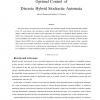Free Online Productivity Tools
i2Speak
i2Symbol
i2OCR
iTex2Img
iWeb2Print
iWeb2Shot
i2Type
iPdf2Split
iPdf2Merge
i2Bopomofo
i2Arabic
i2Style
i2Image
i2PDF
iLatex2Rtf
Sci2ools
128
click to vote
HYBRID
2005
Springer
2005
Springer
Optimal Control of Discrete Hybrid Stochastic Automata
This paper focuses on hybrid systems whose discrete state transitions depend on both deterministic and stochastic events. For such systems, after introducing a suitable hybrid model called Discrete Hybrid Stochastic Automaton (DHSA), different finite-time optimal control approaches are examined: (1) Stochastic Hybrid Optimal Control (SHOC), that “optimistically” determines the trajectory providing the best trade off between the tracking performance and the probability that stochastic events realize as expected, under specified chance constraints; (2) Robust Hybrid Optimal Control (RHOC) that, in addition, less optimistically, ensures that the system remains within a specified safety region for all possible realizations of stochastic events. Sufficient conditions for the asymptotic convergence of the state vector are given for receding-horizon implementations of the above schemes. The proposed approaches are exemplified on a simple benchmark problem in production system manage...
HYBRID 2005 | Hybrid Optimal Control | Hybrid Stochastic Automaton | Hybrid Systems | Stochastic Events |
Related Content
| Added | 27 Jun 2010 |
| Updated | 27 Jun 2010 |
| Type | Conference |
| Year | 2005 |
| Where | HYBRID |
| Authors | Alberto Bemporad, Stefano Di Cairano |
Comments (0)

